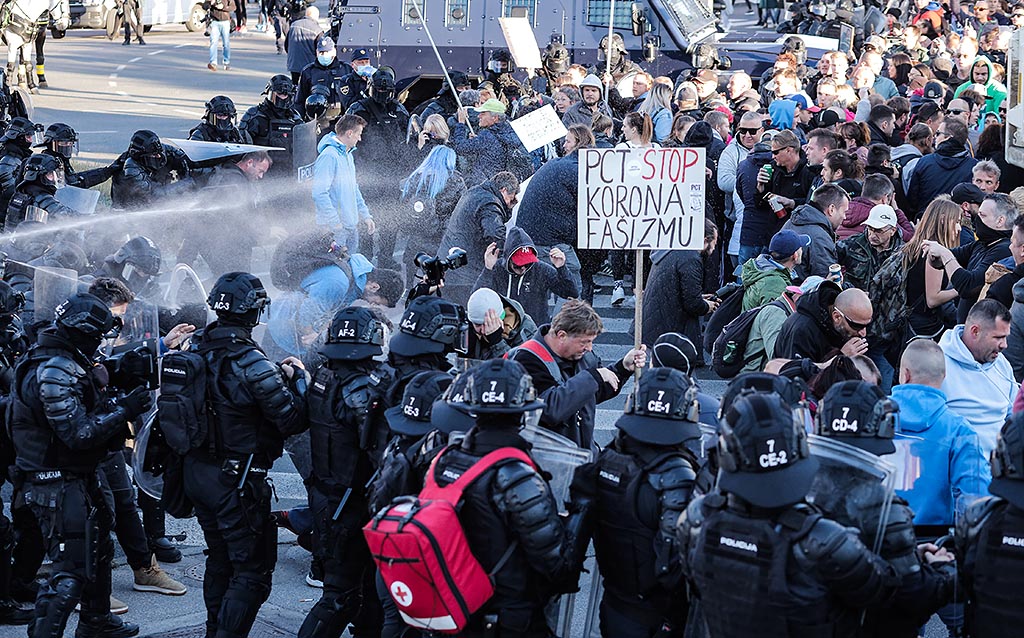By: Peter Jančič (Spletni časopis)
The Special Prosecutor’s Office is not allowed to disclose to the public which four police officers have been charged with negligent work during interventions at violent protests, for which they have proposed suspended prison sentences without a main trial. They claim that only the court can do so. However, the court is withholding this information from the public.
The judge, Marko Beovič, did not inform the police about the suspended prison sentences for the officers charged with negligence; however, the police learned about them from the officers themselves. Their names are not being disclosed because the police must protect them during the ongoing proceedings. I discovered this while inquiring with both the police and the prosecutor’s office about the background of this case, where police officers were sentenced to suspended prison terms, hidden from the public.
The police officers were not notified that any proceedings were underway against them until the court’s decision on the suspended prison sentences. They had no opportunity to defend themselves, present their case, or access legal representation. The entire court process was conducted secretly, and the content remains systematically concealed from the public. The officers can appeal the prison sentences issued by the criminal order, and only then might the public learn their identities, as a standard trial would follow – one that is difficult to keep secret from the public.
If they choose not to appeal, they can only hope that the public will never find out that, according to the Special Prosecutor’s Office, their negligence allegedly led to the “gassing of Ljubljana” during police intervention at violent protests aimed at protecting foreign dignitaries visiting the city.
The judge did not publicly announce the suspended prison sentences, as required by the Slovenian Constitution. Specifically:
Article 24
(Publicity of Trials)
Court hearings are public. Judgments are pronounced publicly. Exceptions are determined by law.
The law governing criminal orders does not provide an exception to the constitutional requirement for public judicial decisions. If court rulings must be public, they should also be accessible to the public; otherwise, there is no public oversight. In this case, the court’s decision is not accessible.
The media have so far been unable to obtain information about who was convicted. Since court decisions cannot occur without a prosecutor, I asked both the police and the prosecutor’s office to explain their roles in prosecuting the officers and provide information on who was involved and what they know about the case. Both refused to inform the public. The police cited the need to protect their employees during the ongoing proceedings, while the prosecutor’s office stated that only the court is authorised to disclose the identities of those convicted at their request.
The case is politically sensitive because key government politicians have been demanding punishment for the “gassing of Ljubljana” for years – referring to the use of tear gas to stop violent protesters. Their choice of words, which evokes associations with the Nazi regime, is no coincidence. Among those who pressured the prosecutor’s office and the court during the criminal proceedings was Lena Grgurevič, chairwoman of the parliamentary justice committee. The public was unaware of the court proceedings, but government politicians were very likely informed.
From the police, Maja Ciperle Adlešič responded to my inquiry about whether they had been informed of the verdict and their role in prosecuting their officers:
“To ensure the protection of our employees’ personal rights, including the right to effective legal protection, we cannot answer your question. The police have not been officially informed of the court’s decision and only have information provided by the employees themselves, which is also subject to lawful protection against disclosure.”
Since the police indicated that they did not initiate the proceedings, I requested information from the Special Prosecutor’s Office, which oversees police work using its own officers who are independent of the regular police force. My inquiry was as follows:
“Dear Sir/Madam,
The police informed me that they are not officially aware of which four officers Judge Marko Beovič convicted of negligent performance of their duties and sentenced to suspended prison terms. I do not know their names because the trial was hidden from the public, and their identities are being withheld. Since the police claim they learned about the verdict from the officers themselves and must protect them during the ongoing proceedings, I request information on whether and when the prosecutor’s office initiated proceedings against these officers and on whose proposal (and on what basis) this was done. I also request the names of all police officers who have faced proceedings for negligence at work or an explanation of why this information is classified.
Respectfully,
Peter Jančič, Editor-in-Chief of Spletni časopis.”
The prosecutor’s office responded anonymously, without a signature, as follows:
“Dear Sir,
The trial in this case is not being conducted in secret because no trial has taken place yet. Whether it will occur depends on whether the accused file objections against the verdict issued through the criminal order. In accordance with the duty to protect sensitive personal data and Article 128 of the Criminal Procedure Act, which grants the right to provide information only to the court when the case is before it, we cannot disclose the names of the accused.
The Special Department of the Special Prosecutor’s Office received several reports regarding this case and conducted a comprehensive investigation from March 2023 to September 2024. Based on the evidence collected, which established reasonable suspicion that the officers committed a criminal offense, the prosecutor’s office filed a charge with a criminal order against four police officers in October 2024.
Since the case is now before the court and the criminal proceedings have not been definitively initiated, we cannot provide further details.
Respectfully.”

